Hi-Score Girl and the Power of Love
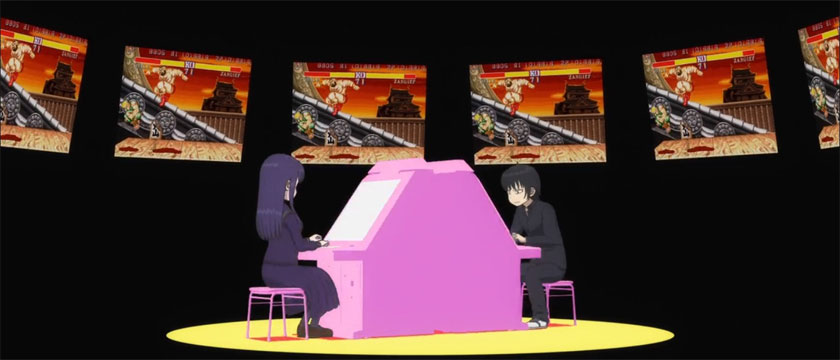
Hi-Score Girl’s alluring seduction comes first and foremost from its nostalgic representation of 1990’s arcade games. Granted, those rose-tinted goggles are specifically fit to peer into the past of Japan’s arcades rather than America’s, but many children and teenagers of the 90’s will revel in the excitement and thrill of competitive Street Fighter II and the evolution that fighting games would experience throughout the decade.
However, viewers will also have to endure the constant and feverish narration of protagonist Haruo Yaguchi. The young, shameless slacker speaks at a million words a minute and with such intensity that it can be a rare exercise in mental exhaustion just to watch more than a few episodes. If you’ve selected the original Japanese voices, that is. I’ve no clue how the English dub sounds and doubt I’ll be finding out anytime soon. Regardless, initial impressions of Haruo are not exactly positive, as he seems like a somewhat greedy, ignorant child, and definitely not the sort to find himself embroiled in a youthful love triangle.
Only he does, and no doubt many will wonder just how he finds himself in such a situation given how clueless he seems to be regarding thoughts of romance and love. That, however, is part of the magic of Hi-Score Girl. By the end of the third episode you’ll be struck in the gut to see how cruel fate can be. Episode four then shifts perspective to a far more calm and soft-spoken character’s inner monologue to not only provide reprieve from Haruo’s high speed chatter, but to better understand his appeal. It would be a mistake to confuse Hi-Score Girl with any other average love triangle romantic comedy, though. Our protagonist may start out as an immature child – what with being a child and all – but through the course of the series, the audience will watch him grow, mature, and improve himself little by little.
All because he never even realized he had fallen in love at such a young age.
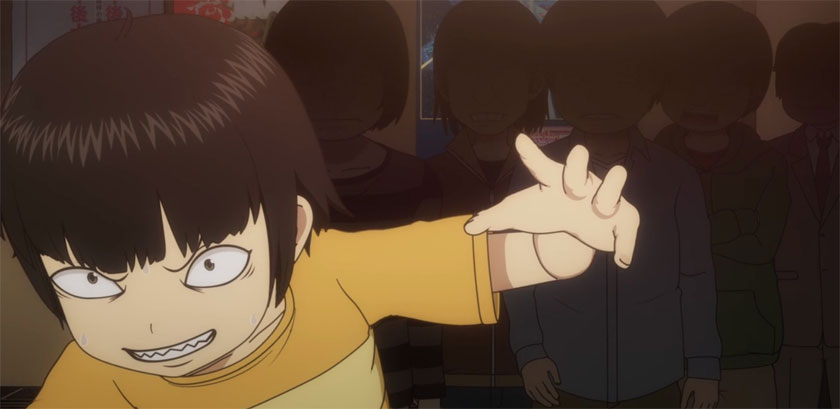
Video games are something of a Trojan Horse to get certain members of its audience interested in Hi-Score Girl, but it can simultaneously act as an unfortunate repellent. Those opening episodes are so deeply invested in the mechanics and tricks of the old retro titles that I imagine anyone disinterested in the medium would struggle to stay awake. Haruo is an especially tricky protagonist, reducing his relatability to anyone unable to comprehend his obsessive attitude towards games. However, the video games themselves are essential to the lessons Haruo learns in life, and how other characters approach games can often reveal their own shortcomings or advantages.
Enter Akira Ono, a mysterious and silent girl born to a wealthy family in charge of a large, international corporation. She seems to excel at everything she does, including being a prodigious video game player. Everyone admires her and showers her with compliments… except for Haruo. Our protagonist would pay her no mind were it not for a fateful encounter at the arcade, discovering her surprising talent and resorting to cheap, exploitative tactics in order to secure a win.
At first blush, Akira Ono is the fantasy girl of a typical gamer boy of the 90’s. She’s pretty, she’s demure, and not only does she like video games, but she’s good at them! Her only “flaw”, if you could call it that, is her absolute silence. All of these traits make Ono out to be a girl too good to be true. As the series develops, however, the audience is drip fed more and more of who Akira Ono really is. She is completely isolated, forced into intense studies in which she is required to excel, and her fate has already been planned out for her by her parents and tutor. Video games become an escape, a source of perceived rebellion, and a window into her empathetic, open-minded personality: overhearing the arcade denizens tear down the “worthlessness” of Street Fighter II’s Zangief, she chose the Russian bear wrestler so that he would not know the same isolation or loneliness that she feels. A sort of camaraderie, one might say.
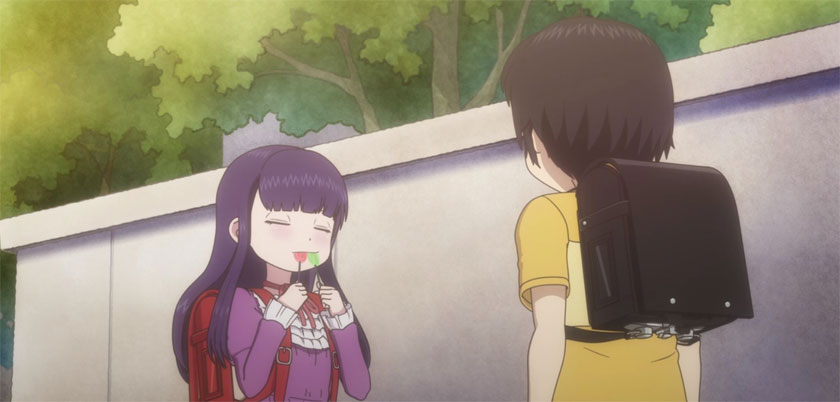
Nonetheless, I cannot help but wonder if Akira Ono is somewhat of a… I don’t want to say fictional or imaginary, but certainly an idealized girl. Koharu Hidaka acts as her female counter, becoming our second perspective protagonist in episode four so that the audience gets to witness the character of Haruo from outside the young man’s inner monologue. Whereas Ono is a girl of many talents and whose skill at video games causes her to shine (in our eyes, at least), Koharu is a plain young girl that behaves in school, gets decent grades, and then watches television with her family or reads. There’s no particular passion or fire to her, and therefore nothing to help her burn bright. She simply exists, and only by chance does she cross paths with Haruo.
This is where we slowly begin to get interesting glimpses into what makes Haruo himself so special, though. Yes, he is often clueless to romance and he is most certainly oblivious to the possibility of girls having feelings for him, but he is increasingly considerate in regards to sharing or treating others, and, most importantly, is always willing to share his passions with others. He is certainly shameless about being a gamer, but it isn’t shamelessness that drives him to share these passions. It is that very passion that drives him to share, to get others to understand the magic and amazement that he himself had discovered.
Koharu is afraid and intimidated by games at first, insisting to instead look over Haruo’s shoulder as he plays, but he refuses to allow this for long. He encourages her to try games herself, to face those challenges and early failures, learning from her mistakes and growing ever stronger.
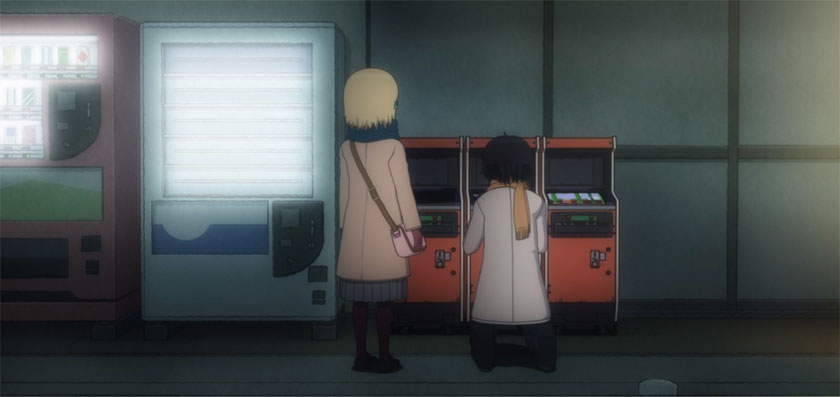
Which, I imagine, is one of the reasons why fighting and arcade games feature so prominently in the story. Not only are they challenging, but they pit player against player in a test of skill. Those motivated to improve themselves will continue playing, practicing, and competing in order to overcome obstacles and face new ones. This adventure is not only true for Haruo’s desire to compete with Ono in video games, but his desire to try and keep up with her in life. He finally begins to study so that he might get into the same school as her. He gets himself a part-time job so… well, it’s so that he can buy more video games, but he also does it so that he can be more independent and contribute some of his earnings to his family. He studies to earn the license to drive a moped around town, granting him greater freedom and mobility.
All of these achievements are met with setbacks, however. Be it in his gaming skill or some external factor interfering with Akira Ono’s life, the gap between them never seems to close. Perhaps it is a bit of a spoiler to address it in such a way, but this is what makes the love triangle so interesting within this story. Koharu is “the easy route” in comparison with Ono. She has no obligation to a wealthy family to render her captive. She eventually throws herself at Haruo, offering her love and more as she is caught up in teenage angst and hormones. She yearns to cross territory that the comparatively chaste Akira Ono does not. If Haruo chose Koharu, then there would be less pain suffered for sure.
He’d be no different, however, from Koharu’s younger self insisting on watching the game over someone else’s shoulder.
True love is worth fighting for, and Koharu’s love has exclusively led her to being better at video games. However, there is nothing else she has striven to discover on her own. She makes very few decisions on her own, led instead by others guiding or suggesting to her. Love drives her, but it doesn’t necessarily drive her to improve herself or her standing.
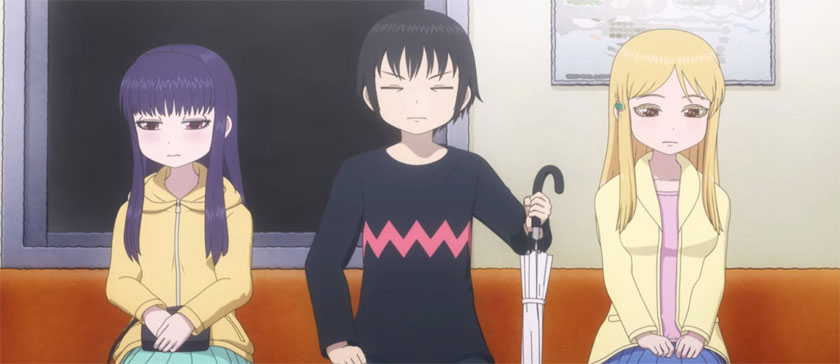
Which no doubt sounds like I’m coming down hard on Koharu. In truth, I’ve always sympathized with the girl, and I am glad to see that her own story seems to continue fittingly in Hi-Score Girl DASH. However, I believe the theme of Hi-Score Girl as it relates to Haruo is quite clear: true love drives you to be better.
The ending of the series is left rather ambiguous, but I think the message it leaves the viewer with is a positive one. Just as Haruo will never stop playing video games and striving to get better at them, he will never stop working towards improving himself and chasing his one true love.
I do not like many romantic comedies or sappy love movies. I found Love, Actually to be one of the most over-hyped, overrated films I had ever seen, its race to the airport breaking believability and drowning me in cheese. Yet when Hi-Score Girl does the same thing in an over-the-top manner, I believe, and I believe because what this series has to say about love is far more realistic and relevant than Hollywood’s escapist consumer trash. For that reason, I highly recommend Hi-Score Girl.
Just… try to tough out those first three episodes.


